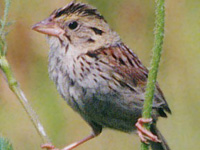Due North - U.S. Native Birds threatened by Global Warming
 The National Audubon Society has just published a study based on 40 years of data, with some shocking findings. The study documented northward range shifts, sometimes of hundreds of kilometres, in 177 bird species.
The National Audubon Society has just published a study based on 40 years of data, with some shocking findings. The study documented northward range shifts, sometimes of hundreds of kilometres, in 177 bird species.The report - Birds and Climate Change - Ecological Disruption in Motion – found that nearly 60% of the 305 species found in North America in winter are on the move, shifting their ranges northward by an average of 35 miles. The findings provide new and powerful evidence that global warming is having a serious impact on natural systems.
Northward movement was detected among species of every type, including more than 70 percent of highly adaptable forest and feeder birds. Only grassland species were an exception - with only 38 percent mirroring the northward trend. But far from being good news for species like Eastern Meadowlark and Henslow’s Sparrow, this reflects the grim reality of severely-depleted grassland habitat and suggests that these species now face a double threat from the combined stresses of habitat loss and climate adaptation.
It is the complete picture of widespread movement and the failure of some species to move at all that illustrate the impacts of climate change on birds.
“They are sending us a powerful signal that we need to take policy action to curb climate change and its impacts, and to help wildlife and ecosystems adapt to unavoidable habitat changes, even as we work to curb climate change itself,” notes the report.
This is a pattern consistent with hundreds of studies of wildlife and plants that document a clear “fingerprint” of global warming. Birds and other animals must adapt to global warming or they will disappear.
Maintaining very large connected habitats allows animals to move across landscapes so that populations are not isolated, and can continue reproducing and adapting to the changes that are unmistakably underway.
These findings have vital implications for Canada. Announcements by Ontario’s Premier McGuinty and Quebec’s Premier Charest are significant in the face of findings like those in the Audubon report. Both leaders have pledged to protect at least half of the intact Boreal forest of their provinces.

“This report shows how a healthy and intact Canadian Boreal forest is not only a shield against global warming, but also the last stop on what would otherwise be a ride to extinction for birds being forced north by these changes,” said Dr. Jeff Wells, Senior Scientist for the Boreal Songbird Initiative. “The recent pledges by Ontario and Quebec to set aside at least half of their intact Boreal forest from development, when enacted, will protect much of the entire continent’s bird life.
Based in Ottawa, the Canadian Boreal Initiative brings together diverse partners to create new solutions for Boreal Forest conservation and works as a catalyst supporting on-the-ground efforts across the Boreal by governments, industry, First Nations, conservation groups, major retailers, financial institutions and scientists.
The full report of the Audubon Society is available here.
For More Information: Audubon SocietyYou can return to the main Market News page, or press the Back button on your browser.


